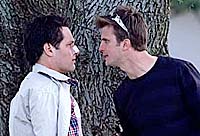The Shape of Things
 for language and some sexuality.
for language and some sexuality.
Reviewed by: Carole McDonnell
CONTRIBUTOR
| Moral Rating: | Offensive |
| Moviemaking Quality: |
|
| Primary Audience: | Adults |
| Genre: | Drama |
| Length: | 1 hr. 37 min. |
| Year of Release: | 2003 |
| USA Release: |



Do you know what the original Adam, the first man, was like? Answer
The world can be a pretty terrible place. If God is all-knowing, all-powerful, and loving, would He really create a world like this? Answer
According to the Bible, every human is born with a depraved nature. We are by nature “dead in trespasses and sins,” and must be “born again” before we can enter into God’s kingdom. Do you clearly understand why no one is good enough to go to Heaven without being “born again?” GO…
There is wonderful HOPE for humanity. The Bible describes it clearly and tells of a wonderful future ahead for those who follow Jesus Christ. To learn the truth about this, we recommend that you view the beautiful motion picture THE HOPE, here online.
| Featuring |
|---|
| Paul Rudd, Rachel Weisz, Gretchen Mol, Frederick Weller |
| Director |
|
Neil LaBute |
| Producer |
| Philip Steuer, Neil LaBute, Rachel Weisz, Gail Mutrux |
| Distributor |
In Neil LaBute’s fascinating and unpleasant film, “The Shape of Things”, idealism and rationalizations are seen for what they sometimes are: ways in which wounded or hateful people can harm other people.
When the story begins, Adam (Paul Rudd) a shy rather insipid but good-hearted fellow is guard at the local art museum. Enter Evelyn (Rachel Weisz), a pretty self-willed artist who speaks continually about the nature of art and life. Evelyn is engaged in defacing the fig leaf on a statue, for various art and sexual reasons. Adam is smitten. Please note the names and the situation: Adam, Eve, fig-leaves.
Adam has two friends, a girl (Gretchen Mol) he was once smitten wit (and whom he perhaps still loves) and his best friend, an overly aggressive alpha male type, who rather liked having a boring klutzy nobody as a friend. The setting is a college town. One can therefore imagine the hormonal, intellectual and personal criticism brimming above and below the surface. Every word out of every character’s mouth is a powerplay with the power to destroy. The viewer listens to these mouthings and is often tempted to ask, “Do these friends truly know what it is to love each other? Or are hidden agendas toward friends more powerful than love? Maybe these folks just don’t have the spiritual strength to restrain their own cruelty?”
Throughout the many conversations in the film, love and admiration are so often mixed in with contempt, inferiority and superiority issues and judgmentalism, I seriously wondered how real these characters were.
The characters in this film are young. And they are Americans who believe that they have the right to say every opinion that comes into their minds, even if those opinions hurt. I remember folks like that from my college days. I also remember types like Adam, lonely good-hearted people whose forbearance and quietness stemmed from their unease with themselves, and their fear-filled love of their opinionated friends.
But Adam’s silence is not necessarily a good thing. Silence has a guilty craftiness all its own. If this story were only about young people who never learned how to keep their mouth shut, it would be a study about coming of age. After all, in time folks like Adam learn to lose cruel friends. But remember those Adam and Eve fig-leaf references. Writer/director LaBute uses other classical allusions: a performance of Medea, (a play about a jealous woman) and Adam’s comment about the strawberry handkerchief in Othello, (a play about manipulation, bitterness and cruel machinations).
We’re in some nasty territory. Neil LaBute also wrote the films, “Your Friends and Neighbors”, and—one of my favorite movies, “In The Company of Men”. In those films, he pretty much skewers humanity. It follows then that LaBute’s films are either loved or hated. The idealist who believes in idealism—whatever that idealism might be—art, religion, politics might be chagrined at LaBute’s implication that idealists are often wounded or hateful people who use their ideals, politics, religion, etc. to dehumanize they wish to destroy.
And yet, as Christians we all know what Jeremiah says, “The heart is deceitful above all things and desperately wicked; who can know it?”
If LaBute were a Christian, he could not have written a more devastating play about human nature and the games people play with themselves and with each other. It’s a cynical film, which is good. Christianity is often cynical of human nature, but unlike the divine cynicism of Christianity, the film gives the viewer no breathing room; there is very little sign of redemption.
For LaBute, bad folks exist, good folks are gullible and not so innocent fodder for bad people, those committed to ideals of truth are often cruel, and healing is not to be found among our friends, because even friends have their agenda.
There is no nudity but many suggestions of sexual activity. No physical violence, but a heavy dose of emotional cruelty. I liked this film immensely, but cannot recommend it for the average Christian audience. This film is definitely not a sweet film about family values.


